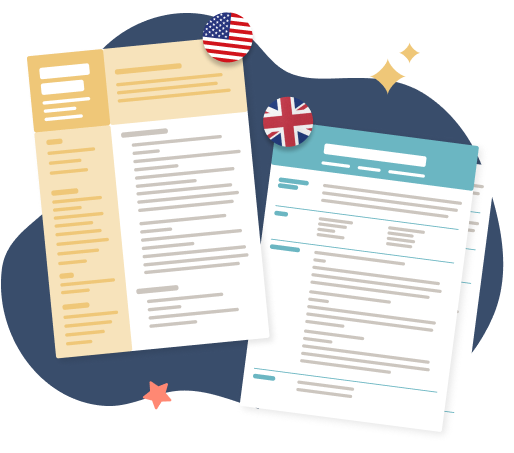Resume vs CV: Which One Should You Use?
Are a CV and a resume the same? Not quite! While they’re often used interchangeably, they have key differences. There are also regional variations, with the UK favouring CVs and the US typically using resumes. In this article, we’ll break down the distinctions between a CV and a resume and show you examples of when to use each.


Our customers have been hired by: *Foot Note
CV vs. Resume: 8 differences and similarities
The terms CV (Curriculum Vitae) and resume are commonly confused, but they refer to two different types of documents depending on your region. While both serve as tools to showcase your experience and qualifications, they have distinct differences, particularly in terms of how and where they are used. This article will explain the key differences between a CV and a resume to help you choose the correct document for your job application.
Resume
| CV | RESUME | |
|---|---|---|
More common in Europe/Asia |
| |
More common in the US/Canada | | |
Emphasises academic achievements | | |
Used for academic or research roles | | |
Used for most job applications | | |
Includes detailed academic information (e.g., publications, awards) | | |
Customisable for each job | | |
Length | |
|
CV vs Resume: Real-life examples
When applying for jobs or academic positions, understanding the right type of CV or resume to submit is crucial. In this section, we’ll introduce three key personas: an academic professional, a job seeker in the UK, and a job seeker in the US. Each of these personas has a different set of needs when crafting their CV or resume, and understanding these differences will help you choose the correct format.
Academic CV: Dr Eleanor Marshall

Background
Location: United Kingdom
Age: 35
Occupation: University Lecturer and Researcher
Education: PhD in Environmental Science
Scenario:
Dr Marshall is applying for a tenured position at a prestigious university. She has several years of teaching experience, numerous peer-reviewed publications, and has presented at international conferences. Her primary focus is on advancing scientific research and teaching in her field.
Key features of her CV:
- An extensive listing of research publications, academic achievements, and teaching experience
- Details of research grants and funding she has secured
- Focus on academic conferences and seminars where she presented papers
- A detailed section on professional affiliations (e.g., memberships in environmental science associations)
- Multiple references from colleagues in academia
Why she needs an academic CV:
Dr Marshall’s CV needs to showcase her academic achievements, research, and teaching experience in detail, making it longer and more comprehensive than a typical employment CV. The academic CV is essential for demonstrating her qualifications in higher education and research, where her career progression is based on publishing, teaching, and contributing to her academic community.
Employment CV: Ben Thompson

Background:
- Age: 28
- Occupation: Marketing Executive
- Education: BA in Business and Marketing
- Location: London, UK
Scenario:
Ben has worked in marketing for several years but is now seeking a new opportunity in a mid-level managerial role in a growing marketing agency. He is applying for the role of Marketing Manager, where he can leverage his skills in team leadership, digital marketing, and brand strategy.
Key features of his CV:
- Clear focus on his work experience, with measurable results (e.g., “Increased client engagement by 40% through a targeted social media campaign”)
- Sections highlighting specific skills such as SEO, content strategy, and project management
- Education section that includes his degree, along with relevant certifications or short courses
- A skills-based section that outlines his technical abilities (e.g., proficiency in Adobe Creative Suite, Google Analytics)
- Professional summary that briefly outlines his career history and aspirations
Why he needs an employment CV:
Ben is based in the UK and will therefore use a CV, specifically an employment CV, for his job applications. Ben’s CV focuses on demonstrating his qualifications for specific job roles in the marketing sector. It’s a marketing-focused document that will catch the attention of recruiters by emphasising his practical expertise, workplace successes and relevant education.
Resume: Mark Jenkins

Background:
- Age: 22
- Occupation: Software Developer
- Education: MSc in Computer Science
- Location: New York, USA
Scenario:
Mark is applying for his first job as a Software Developer at a tech startup in Silicon Valley. While he has no full-time work experience yet, he has completed several internships, worked on personal coding projects, and contributed to open-source software. He’s eager to land a role that will allow him to grow his skills.
Key features of his resume:
- A concise, one-page document focusing on relevant skills, academic projects, and internships
- Sections that highlight technical skills (e.g., programming languages like Python, JavaScript, and Java)
- Details of relevant coursework and coding bootcamps that complement his degree
- Projects section where he showcases personal and collaborative work (e.g., a mobile app he developed or an open-source project he contributed to)
- A brief summary at the top that explains his passion for tech and his eagerness to contribute to innovative projects
Why he needs a resume:
In the United States, Mark needs a resume because it’s the standard document for applying for jobs. Unlike the longer and more detailed CV, a resume is a brief, targeted document summarising his qualifications and experiences relevant to the job he’s applying for. Since he has little professional experience, his resume focuses more on his education, technical skills, and personal projects rather than work experience.
CV vs Resume: What to Include and What to Avoid
Understanding what to include and avoid when creating a CV or resume is essential for tailoring your application to the job and region. The key differences between a CV and a resume are reflected in the content and presentation. Below is a guide to help you navigate these differences.
| DO’S | DON’TS | |
|---|---|---|
CV | |
|
Resume |
|
|
CV vs Resume: Applying internationally
When applying for jobs internationally, understanding the differences in how CVs and resumes are used can help ensure your application aligns with local expectations. Different regions have distinct preferences regarding the format, content, and presentation of application documents. Below is a breakdown of the key differences and additional pointers for international job seekers.
Applying to the UK: Use a CV with a chronological format
In the UK, the CV is the preferred document for job applications. Your CV should follow a chronological format. This means your most recent job or qualification should appear at the top, followed by your previous roles or education in reverse order. This format makes it easy for hiring managers to see your most recent experience first.
When preparing a UK CV, remember to:
- Use British English for spelling, grammar, and terminology. For example, use “organisation” instead of “organization,” and “travelling” instead of “traveling.”
- Avoid including a headshot. UK employers do not expect or typically want to see a photo of you on your CV.
- Emphasise academic achievements, publications, and professional qualifications, as UK CVs are generally more detailed than resumes.
Applying to the US: Resume with a concise focus
In contrast, the US typically uses a resume, a shorter document focused on your relevant work experience and skills tailored to a specific job. Resumes are generally one page long (two pages are acceptable for those with more extensive experience), and they highlight quantifiable accomplishments, key skills, and experiences that directly relate to the role you’re applying for.
When preparing a resume for the US, be sure to:
- Use American English for spelling and phrasing.
- A headshot is optional but not commonly included, especially for positions outside sectors like modelling or entertainment.
- Tailor your resume to each specific role, focusing on your most relevant skills and achievements. Unlike a CV, which often provides a comprehensive career history, a resume should be concise and directly aligned with the job description.
What is a CV?
A Curriculum Vitae (CV) is a comprehensive document that provides a detailed overview of your professional and academic history, usually in a reverse-chronological format. It is a vital tool used in job applications to present your professional profile to potential employers and is required for most job applications. A CV is a snapshot of your career, showcasing your education, work experience, skills, and other achievements.
A standard CV consists of the following elements:
- Contact section
- Personal statement
- Work experience
- Academic experience
- Education
- Skills section
- Additional sections, such as projects, publications, or awards
UK CV examples
Need some inspiration for your CV? Browse through our selection of CV examples featuring various formats and styles suited to different industries and career stages. Explore these CVs to find the perfect template for your next application.
Types of CVs
The format and content of a CV can differ based on the country and the type of job you’re applying for. There are two primary types of CVs:
- The employment CV
- The academic CV
| Employment CV | Academic CV | |
|---|---|---|
Purpose | Used for job applications across most industries | Used for academic and research roles |
Length | 1-2 pages | 3-5+ pages |
Content focus | Work experience, skills, and qualifications | Academic background, research, publications, teaching |
Location | Common in the UK and Europe | Used globally for academic and research roles |
When to use | Non-academic roles across various sectors | Academic, research, or university positions |
References | Not necessary | Always included |
What is an employment CV (or standard CV)
An employment CV, also called a standard CV, is the typical document used for job applications in the UK, Europe, and many other parts of the world. It provides a comprehensive overview of your career, education, skills, and experience.
Purpose: The employment CV showcases your qualifications, skills, work history, and achievements to potential employers. It is used for both entry-level and senior positions across various industries.
Here’s what you’ll want to include in an employment CV:
- Personal information: Name, contact details, location (city/country).
- Personal summary: A brief introduction outlining your skills, experience, and career aspirations.
- Work experience: A detailed list of jobs you’ve held, including job titles, company names, dates, and responsibilities in chronological order.
- Education: Qualifications and academic background, including degrees and relevant certifications.
- Skills: Hard and soft skills related to the position.
- Certifications and training: Any additional professional training or qualifications that are relevant to the role.
- Additional Sections: Depending on the role, you may include sections for volunteer work, hobbies, languages spoken, etc.
An employment CV typically ranges from 1 to 2 pages (depending on your experience level), focusing on the most relevant and recent details. You should use this type of CV for most industries, except for academic, research, or highly specialised fields, which require a more detailed overview of your education, publications, and research. For these roles, an academic CV is the better choice.
What is an academic CV?
An academic CV is a specialised type of CV used for positions in academia, research, and education. It is much more detailed than an employment CV or resume and focuses on your academic achievements, research experience, publications, and other scholarly activities.
Purpose: The academic CV is designed to demonstrate your expertise in a particular field, your research contributions, and your experience in teaching or academic publishing. It’s typically used for university faculty roles, research positions, or postdoctoral fellowships.
Here’s what you’ll want to include in an academic CV:
- Personal information: Full name, contact details, academic titles.
- Personal statement or research interests: A detailed section that explains your academic focus, research goals, and teaching philosophy.
- Education: A comprehensive list of all academic qualifications, including degrees, universities attended, and dissertation or thesis titles.
- Work experience: This includes teaching roles, research assistantships, and any other relevant academic positions.
- Publications: A list of your published works, including books, journal articles, and conference papers.
- Research projects: Detailed descriptions of research projects, including methodologies and outcomes.
- Conferences and presentations: A list of academic conferences you’ve attended or presented at.
- Grants and fellowships: Funding or academic awards you’ve received to support your research.
- Professional affiliations: Membership in academic or professional organisations.
- References: Academic or professional references who can vouch for your work.
An academic CV is typically much longer than an employment CV or resume, ranging from 2 to 5 pages or more, depending on your experience and the depth of your research. Use an academic CV when applying for positions such as lecturers, assistant professors, and research assistants. The term “CV” is typically reserved for these academic roles in the United States.
What is a resume?
A resume is a brief document summarising your relevant work experience, skills, education, and achievements, all tailored for a specific job you’re applying for. Think of it as your professional highlight reel, usually just one page long. A good resume makes it easier for employers to see why you’re a great fit for the job, hopefully leading to an interview!
Typically, a resume consists of the following elements:
- Personal information
- Personal statement
- Education
- Work experience
- Skills (both hard and soft skills)
- Additional sections such as certifications, awards, volunteer work, or professional affiliations
Resume examples:
Looking for inspiration for your resume? Check out our collection of resume examples, showcasing various formats and styles tailored to different industries and career levels. These resume templates are designed to help you create a standout application for your next job opportunity.
CV vs Resume: Key takeaways
- Use an employment CV if you are applying for jobs in the UK, Europe, or other regions that follow the European style of job applications. An employment CV suits most industries, including hospitality, retail, administration, and customer service.
- Use an academic CV if you’re applying for roles in higher education, research, or teaching. This CV type is expected in academia, where you must provide detailed insights into your educational qualifications, research, and contributions to your field. An academic CV can be used in any country and is usually requested in the job application.
- Use a resume if you are applying for jobs in the US or Canada. Resumes are typically used in all job sectors in the US, except for academic or research positions.
| Employment CV | Academic CV | Resume | |
|---|---|---|---|
Purpose | Used for job applications across most industries | Used for academic and research roles | Used for job applications in the US and Canada |
Length | 1-2 pages | 3-5+ pages | 1-2 pages |
Content Focus | Work experience, skills, and qualifications | Academic background, research, publications, and scholarly accomplishments | Brief overview of work experience, skills, and achievements |
Location | Common in the UK and Europe | Used globally for academic and research roles | Primarily in the US and Canada |
When to Use | Non-academic roles across various sectors | Academic, research, or university positions | Jobs in the US or Canada (non-academic) |
References | Not necessary | Always included | Not necessary |
Should I use a CV or a resume when applying for jobs?
It depends on the country, industry, and job requirements. Use an employment or standard CV if you apply for jobs in the UK or Europe. If you are applying for jobs in the US, you should use a resume. If you’re applying for faculty jobs or academic postdoctoral research opportunities, grants, and fellowships. use an academic CV regardless of your location.
What is the main difference between a CV and a resume?
A CV is a detailed document that lists your academic achievements, qualifications, and career history. It’s used primarily in the UK and Europe. A resume is a similar but more concise document used mainly in the United States and Canada to summarise your skills, experience, and education relevant to a specific job. An academic CV differs from both in that it is a much more detailed document, providing in-depth information about your academic background, research, publications, and other scholarly achievements.
Can I use a CV for any job application?
In the UK and Europe, a CV is typically used for all job applications in the private, public, and non-profit sectors. However, for academic or research positions (in any region), you should use an academic CV. In the US, you should use a resume unless you’re applying for a research or academic role.
When should I use an academic CV?
Use an academic CV when applying for roles in academia, research, or education. This includes positions at universities, research institutions, or any role requiring a detailed account of your academic background, research experience, publications, and other academic achievements. This applies regardless of your location.
How do I know whether to use a CV or a resume in the US?
In the US, a resume is the standard document for most job applications. Use a CV only for academic, research-based, or teaching positions. A CV in the US is similar to the academic CV used in other regions, where it includes comprehensive details about your education, research, and publications.
Can a CV be used in the US?
Yes, a CV is used in the US, but it’s specifically for academic or research-based roles; otherwise, a resume is expected.
How long should a CV or resume be?
A CV (for employment purposes) in the UK is usually between 1 and 2 pages, but it can be longer for academic CVs, depending on your qualifications.
A resume in the US should ideally be one page for those with less experience or two pages for more seasoned professionals.
Are there any regional differences in CV formatting?
Yes, in the UK, CVs tend to follow a more standardised format, often focusing on job experience, education, and skills. In the US, resumes tend to be more concise and focus more on your skills and achievements rather than a detailed job history.
Do I need a cover letter along with my CV or resume?
Yes, it’s highly recommended to include a cover letter with your CV or resume unless the employer specifies otherwise. The cover letter should introduce yourself, highlight why you’re a good fit for the role, and demonstrate your enthusiasm for the company or institution.
Is a student CV the same as an academic CV?
No, a student CV and an academic CV serve different purposes and have distinct formats. A student CV typically focuses on showcasing your skills, part-time work experience, internships, and extracurricular activities, aimed at securing internships or entry-level roles.
In contrast, an academic CV is more detailed and structured, emphasising your educational qualifications, research experience, publications, teaching roles, and academic achievements. Academic CVs are used primarily for applications to higher education institutions, research positions, or academic conferences.

Andrew Smith
Senior Content Writer
Meet Andrew Smith – an accomplished English copywriter with a strong background in SEO optimisation. Passionate about producing engaging content, Andrew has written across various fields, including health and fitness, security, travel, and tourism.
*The names and logos of the companies referred to above are all trademarks of their respective holders. Unless specifically stated otherwise, such references are not intended to imply any affiliation or association with myperfectCV.













